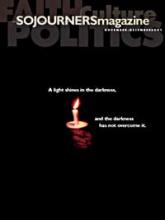For more than 20 years, Elie Wiesel has been America's official bearer of memory, keeper of accounts, and arbiter of propriety regarding the Holocaust. In the 1960s and '70s, Wiesel published memoir, fiction, and polemic aimed at holding up the reality of mass annihilation before a world that might have preferred to move on. In 1978, Wiesel was chosen by President Jimmy Carter to chair the Commission on the Holocaust, which resulted in the museum that now sits on the Washington, D.C. Mall. In 1986, Wiesel's status was sealed when he received the secular beatification of the Nobel Peace Prize.
Wiesel's message about the Holocaust has always been a two-edged sword. One side holds that the Holocaust was a specifically Jewish event, and one unique in all of human history. At the same time, Wiesel has insisted that the revelation of human evil that took place in Europe in the 1940s places upon us a special obligation to stand up in defense of the persecuted wherever they are found.
Read the Full Article
